Last Updated: June 30, 2022
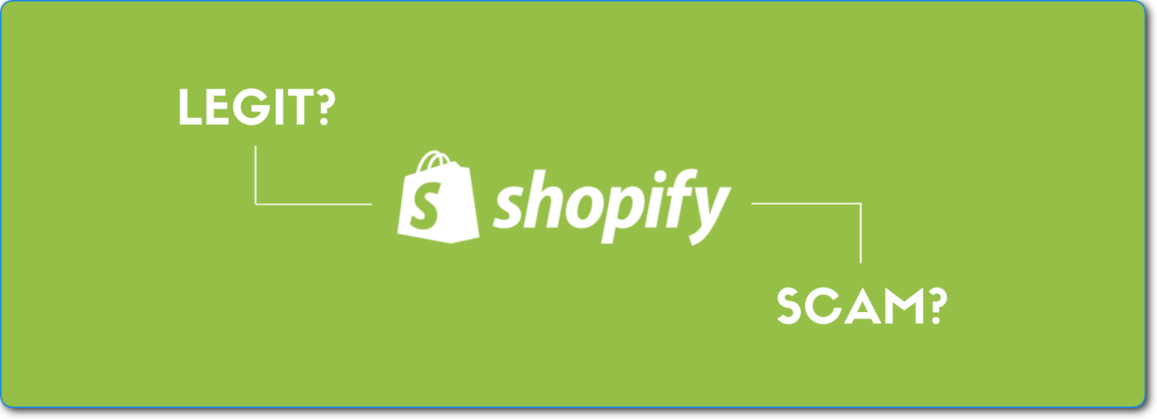
So, you heard about Shopify or maybe know what it is, but are not quite sure if it’s a legit company?
If that is the case, you’re on the right page.
In this post, I am going to give you an honest but comprehensive answer to the question: Is Shopify legit?
By the end of this article, you’ll know exactly whether this is a legit platform or not so you can avoid getting scammed and decide whether to use it or not.
Let’s dive right in!
Is Shopify Legit?
Shopify itself is definitely a legit ecommerce platform for building online stores to sell products. However, the stores hosted on their platform may not be legitimate as Shopify does not have strict policies and thorough vetting systems.

You may be wondering: Arslan, How can you say that Shopify is a legit company?
Here’s why:
- Personally used it for offering “Shopify store creation services on Fiverr”.
- Shopify has been in business for over 16 years.
- It is among the top 10 largest ecommerce companies by market cap.
- Shopify powers over one million businesses in more than 175 countries.
- Some of the well-known brands trust Shopify for hosting their online stores.
I am saying from personal experiences, facts, and statistics that Shopify is a legit company.
When I was a freelancer, I offered “Shopify dropshipping store creation services on Fiverr” and I think I built over 60 stores for my clients using Shopify.
Despite my personal experiences, Shopify has been in business for over 16 years and if it weren’t a legit platform, it probably would have been dead long ago.
Furthermore, it is among the largest e-commerce companies by market capitalization, powering over 1 million businesses in more than 175 countries.
Moreover, some of the world’s most popular brands such as Kylie Cosmetics, Gymshark, Allbirds, ColourPop, and many more are hosted on Shopify.
So to sum up the question, is Shopify legit? I would say:
A platform that has been in business for so long, being among the top ecommerce companies, powering over one million businesses, and trusted by top brands for hosting their online store is certainly a legitimate company.
Although the platform by itself is legit, the stores hosted on their platform may not be legit and scam you.
For those who don’t know, Shopify is not an online shopping website but rather a subscription-based eCommerce platform that allows anyone to set up their online store and sell physical or digital products on it.
No doubt, Shopify is one of the best eCommerce platforms for launching your online store but here’s the major problem for those buying from stores hosted on their platform:
Shopify does not have strong policies and rules for verifying the store and store’s owner which means anyone can host a store with them in minutes and start selling to customers regardless if they’re legitimate or scammers.
Even though Shopify has managed to create an extremely easy-to-use ecommerce platform for launching online shopping sites without any hassle, this attracts scammers as well as legitimate retailers.
Despite the fact that there are many legitimate sellers, this allows scammers to steal customer’s money easily.
The scammers can simply launch an online store with Shopify, add products, set up pretty cheap prices to attract customers, and spend some money on advertising those products through Facebook Ads, Google Ads, or any other advertising medium.
As soon as a good number of orders come in and receive customer’s money, scammers just close their store, the site is out of reach now, and consumers are unable to contact the seller, receive their purchases, or ask for refunds.
So as a customer, you might be thinking of contacting Shopify’s customer support team but don’t expect them to get your money back.
As one of their official partners clearly stated that “Shopify is not directly responsible for individual business behaviors” in response to a complaint about a Shopify store scamming its customers.
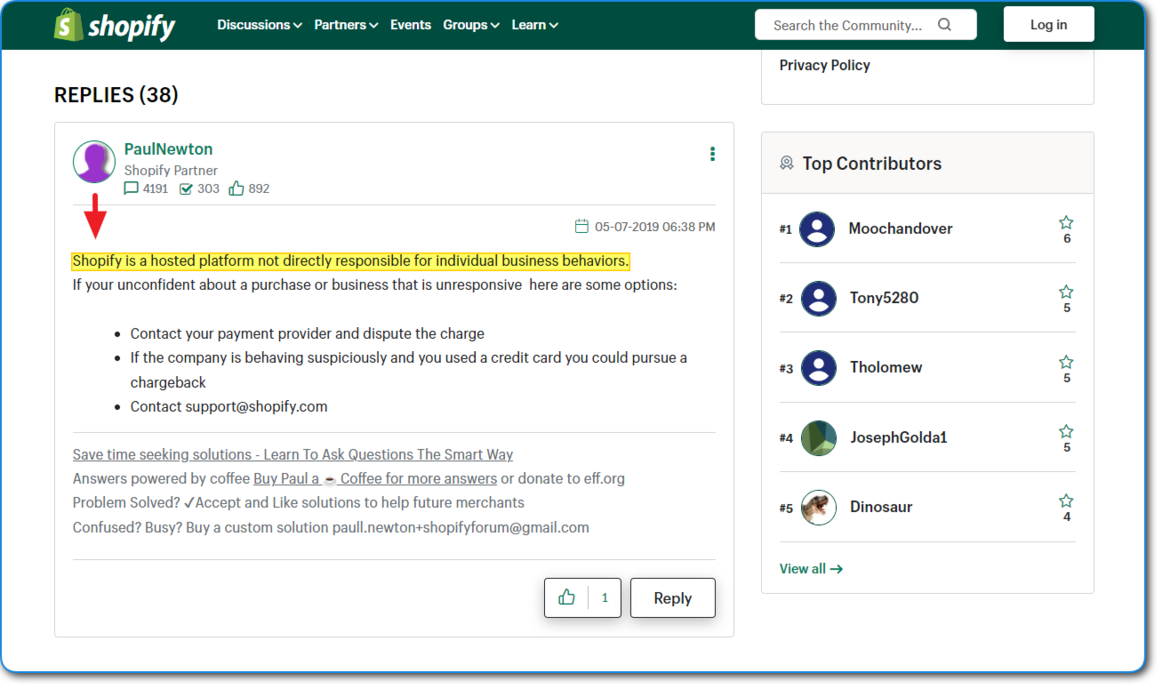
To conclude, I would say:
Shopify is a completely safe and reliable eCommerce platform for those who want to set up their online store and start selling. However, it’s not completely safe for customers who want to buy from stores hosted on their platform.
So what can customers do?
The only option customers have is to identify the Shopify store if it’s an authentic, genuine, and legit store or not before purchasing from them.
Wondering how? Here are the:
7 Tips To Tell If A Shopify Store Is Legit
Before we get into the details of identifying a Shopify store, it’s crucial to keep in mind the first tip to avoid scams and that is:
1. Beware of Online Stores Found On Social Media
The majority of fake Shopify stores are advertised on social media platforms, especially Facebook and Instagram because these two platforms also don’t have a thorough vetting system and let anyone advertise their goods without checking if they are legit businesses or not.
Sadly, these companies don’t care about customers getting ripped off; instead, they care about advertisement revenue no matter who is running the ads through their platform whether it’s a scammer or a genuine person.
So, does this mean we shouldn’t purchase any product advertised on Facebook or Instagram?
Absolutely not! Despite scammers trying to take advantage of customers, there are plenty of legitimate online stores as well.
Then, what should we do as a customer?
You should follow all the tips I am about to share, so let’s begin.
2. Avoid Buying If It Looks “Too Good To Be True”
You may have heard the adage multiple times “If it seems too good to be true, it probably is.” This applies to whether you’re buying from a Shopify store or any other online shopping website.
Online scammers list items on their online store at highly discounted prices to lure in customers. A customer thinks they’re getting a deal, when really they are handing over their hard-earned money for getting nothing at all or maybe fake, low-quality, counterfeit items.
Therefore, be cautious of any online shopping website that appears to be selling products for considerably less than the retail price.
3. Look Up The Domain Age
Before buying anything from a website, look up their domain age as well using Whois Lookup as it helps in verifying whether the website has been in business for an established amount of time or not.
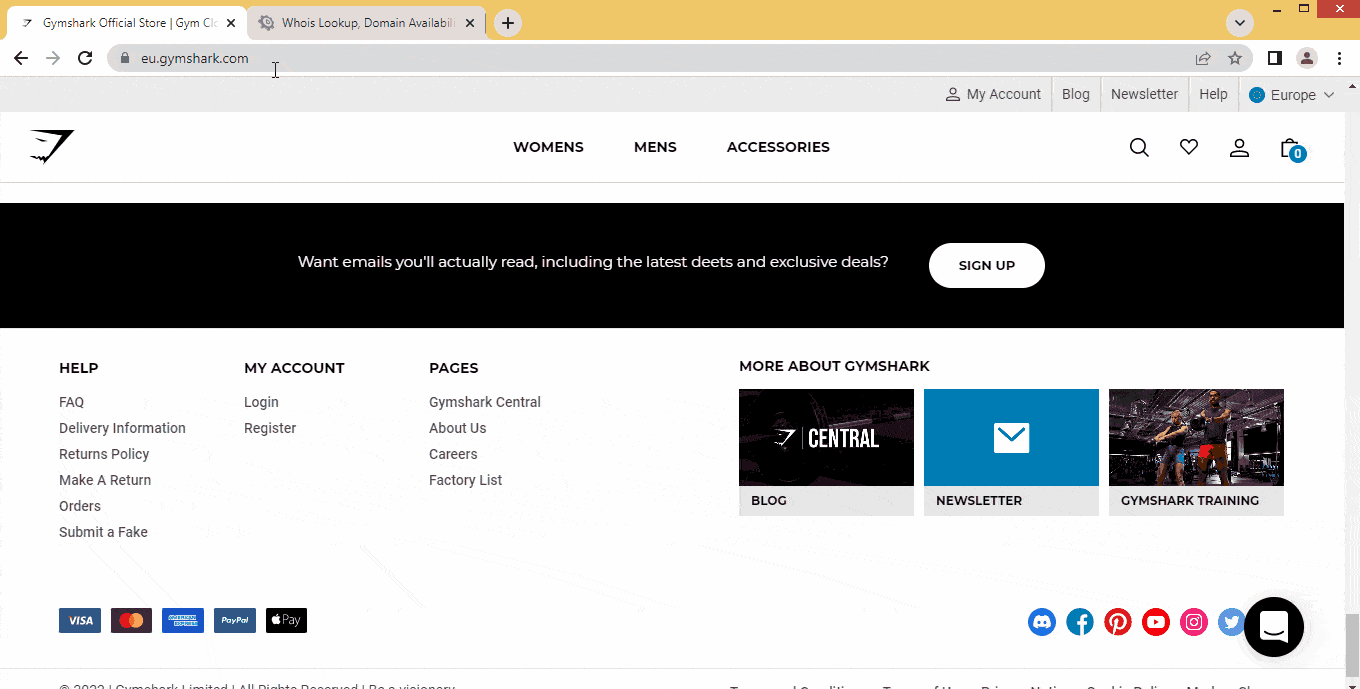
Genuine online shopping sites usually have a long lifespan, whereas scam and phony websites often only last a short time as they are either exposed by the buyers who bought from that website or shut down by the scammers themself.
It is recommended not to purchase products from websites that were created in the past 6 months.
Okay, let’s assume you come across an online shopping website that doesn’t sell items at unbelievable prices and their domain age is more than 6 months old, then the next thing you should do is to…
4. Analyze The Overall Website
Scammers usually create fake Shopify stores in a short amount of time, ignoring attractive design, and spelling and grammar mistakes will likely appear throughout the site as well.
Therefore, you should carefully verify whether the site was professionally produced or if it was thrown together in a hurry.
If the website contains typos, grammar errors, poor quality images, sloppy design, poorly worded policies (privacy, return, shipping), or no policy pages at all then you’re probably on a scam site.
Legitimate online stores usually have a professional design, high-quality logo and images, properly written policy pages, rarely have spelling or grammatical mistakes, and a contact page.
However, you must also:
5. Review Their Contact Information
Another important tip to identify the legitimate Shopify store or any other online shopping site is to check their contact information.
If their contact page contains a phone number, physical address, or branded email address, for instance, [email protected] or something like that then it’s a sign of a genuine site.
Even if a store has a branded email address, I recommend purchasing items only from stores with multiple contact options such as phone number, live chat, or physical address.
Moreover, I suggest you contact them via the available options before purchasing anything from them and see how friendly and cooperative they are with their customers. If they are not responsive, don’t buy from them.
However, stores without a contact page or a contact page with just a generic email address like “[email protected]” and don’t have a physical address, phone, or live chat should be avoided at all costs.
On top of all that, you must also:
6. Check The Company’s Social Media Presence
Generally, legitimate shopping stores whether it’s hosted on Shopify or any other platform have a strong presence on social media that’s why you must check their presence on social media platforms and see if they have a genuine following and legitimate posts or not.
Genuine companies linked their social media channels somewhere on their website usually on the footer, about us page, or contact us page.
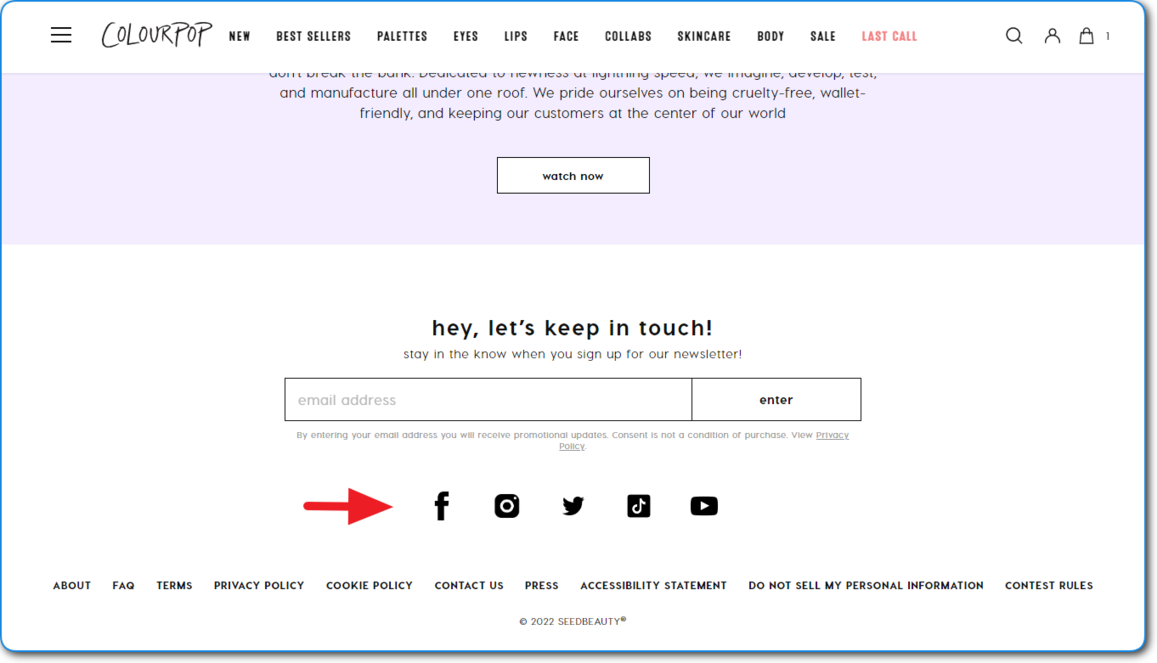
Personally, I recommend buying from online stores that must have social media accounts and are followed by at least 500K followers.
However, avoid buying from stores with no social media accounts linked on their online shopping websites or accounts with few followers, no posts, or posts with low organic engagement.
Finally, you should also:
7. Look For Reviews About The Company
While all the tips above can help you easily spot a scam or legitimate Shopify store or other online shopping stores, you should also look for customer reviews about that company to get insight into how it treats its customers.
You should research about the company on YouTube, Reddit, Quora, or just Google the company’s name + review. For example, a Gymshark review.
To sum up all the points, here’s what you should check before purchasing from any online store whether it’s hosted on Shopify or any other platform:
- They are not selling items for extremely low prices, just use your common sense when you see an item for an unbelievable price.
- Their domain age should be at least 6 months old.
- The store must have a professional design, high-quality images, properly set up policy pages, and doesn’t contain spelling or grammatical errors.
- Must have a contact page with multiple options to contact or at least branded email address and any other option to contact.
- Has a strong presence on social media channels.
The above points are enough to determine whether a store is legitimate or a scam, however, it’s a good idea to look for reviews online (online forms, blogs, social media) about the store you’re considering buying from.
To give you an idea of how legitimate Shopify stores look like, check out some of these stores hosted on Shopify:
However, if you’re thinking of starting your own store on Shopify then you may be wondering:
Is Shopify Safe To Host My Online Store?
Shopify is a completely safe and secure platform for hosting your online store as all the stores hosted by them are PCI DSS compliant by default and are issued with a free SSL certificate so that the payment, business, and personal details can be secure.
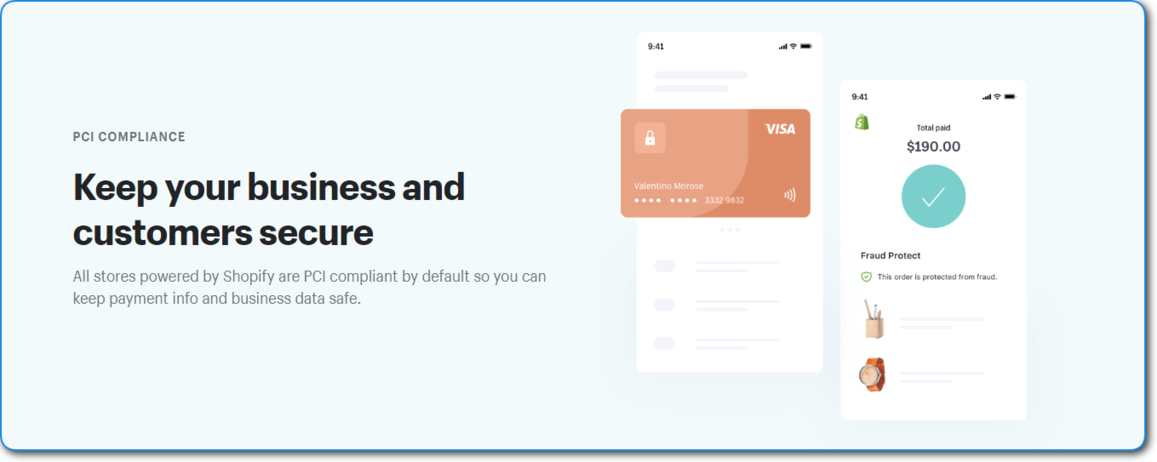
For those who don’t know about PCI DSS, it stands for Payment Card Industry Data Security Standard and it is a set of security standards designed to make sure that any company which handles credit and debit card information maintains a secure environment.
The PCI Standard was jointly created by four major credit and debit card companies: Visa, MasterCard, Discover, American Express, and JCB to protect cardholder data and reduce the risk of fraud.
However, it is administered by the Payment Card Industry Security Standards Council.
Any organization that is PCI Compliant means that their systems are secure and customers can trust them with their sensitive payment card information.
And, Is Shopify PCI Compliant?
Yes, Shopify is certified Level 1 PCI DSS compliant and all stores hosted on their platform are automatically PCI compliant by default and their compliance covers all six categories of PCI standards:
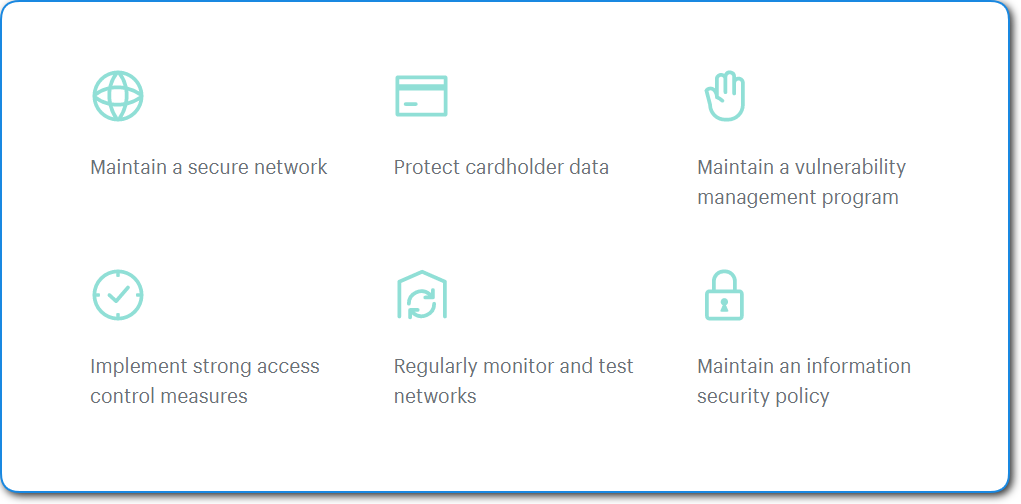
So yes, it is completely safe and secure to host your online store on Shopify.
However, if you’re considering buying from Shopify stores, you might be wondering:
Is It Safe To Buy From Shopify Stores?
Generally, it is totally safe and secure to buy from stores hosted on Shopify as all the stores powered by them are PCI compliant by default and are issued with a free SSL certificate automatically to ensure that anyone shopping from a Shopify store is protected from data theft.
Apart from that, any store hosted on their platform can only receive payments using their inbuilt secure checkout system and available payment methods.
However, this doesn’t mean you’re safe from scammers who host their stores on Shopify. To avoid scams, you will need to follow the tips I have shared with you above.
This simply means that Shopify store owners never receive any of your card details. In simple words, your sensitive information like your credit card details is not passed onto Shopify store owners whether it’s a legitimate seller or a scammer.
The Shopify store owner just receives the necessary information about the customer such as first name, last name, email, and address so that they can deliver the order.
Conclusion
Shopify itself is a completely legit and safe ecommerce platform to launch an online store and sell online. However, the stores hosted on their platform may not be legit. Therefore, you should always do your due diligence before buying from any Shopify store.
For those who want to set up their online store, they don’t need to worry about Shopify’s legitimacy and safety because it is a totally legitimate, safe, and reliable ecommerce platform for them.
In fact, Shopify is the industry’s leading ecommerce platform and it is my #1 recommendation for anyone thinking of starting their own online shopping store as it is extremely user-friendly and gives you all the tools you need to easily build a professional-looking online store.
Although Shopify is entirely safe for hosting online stores, it’s not completely safe and reliable for those who are considering buying from Shopify stores.
The only major problem with Shopify is that they don’t have strict policies and rules for verifying the store and store’s owner which means anyone can start their Shopify store whether they are genuine people or scammers.
However, you can easily tell if a Shopify store is legit or not by following the tips listed above.
Got any questions, or want to share your own experiences with Shopify?
Feel free to ask and share your insights in the comments below.
Thanks Arslan for a comprehensive and thorough explanation of Shopify platform and Shopify stores.